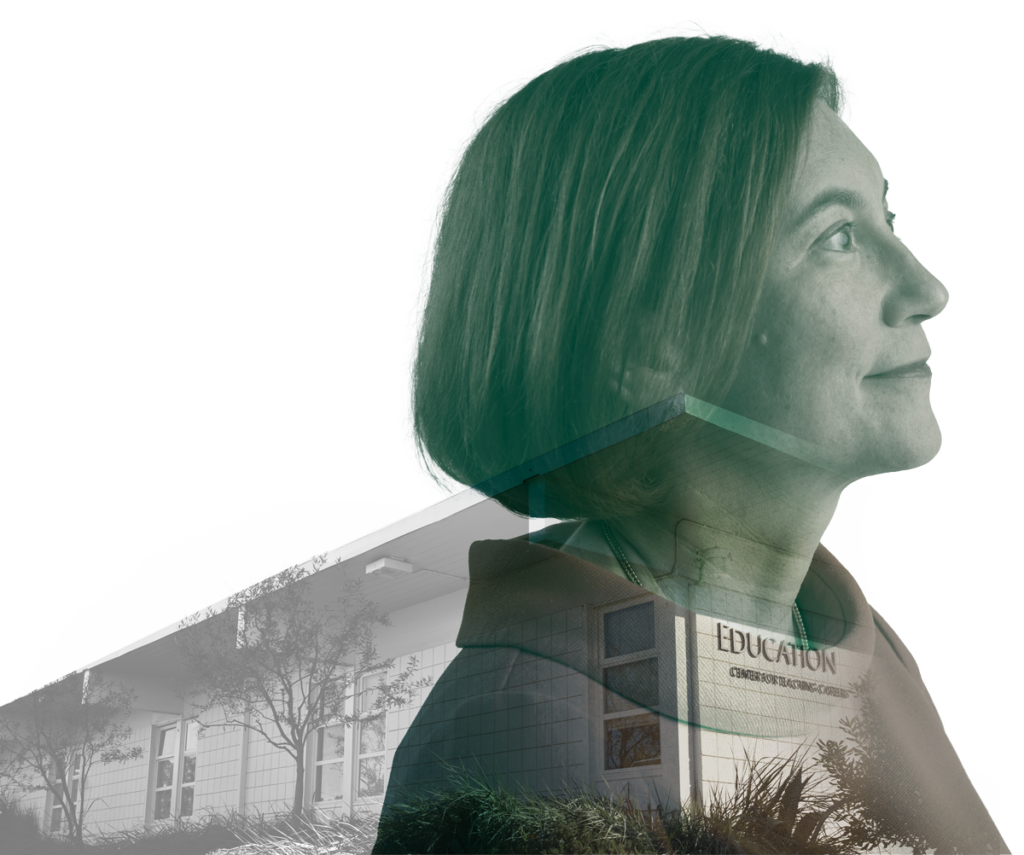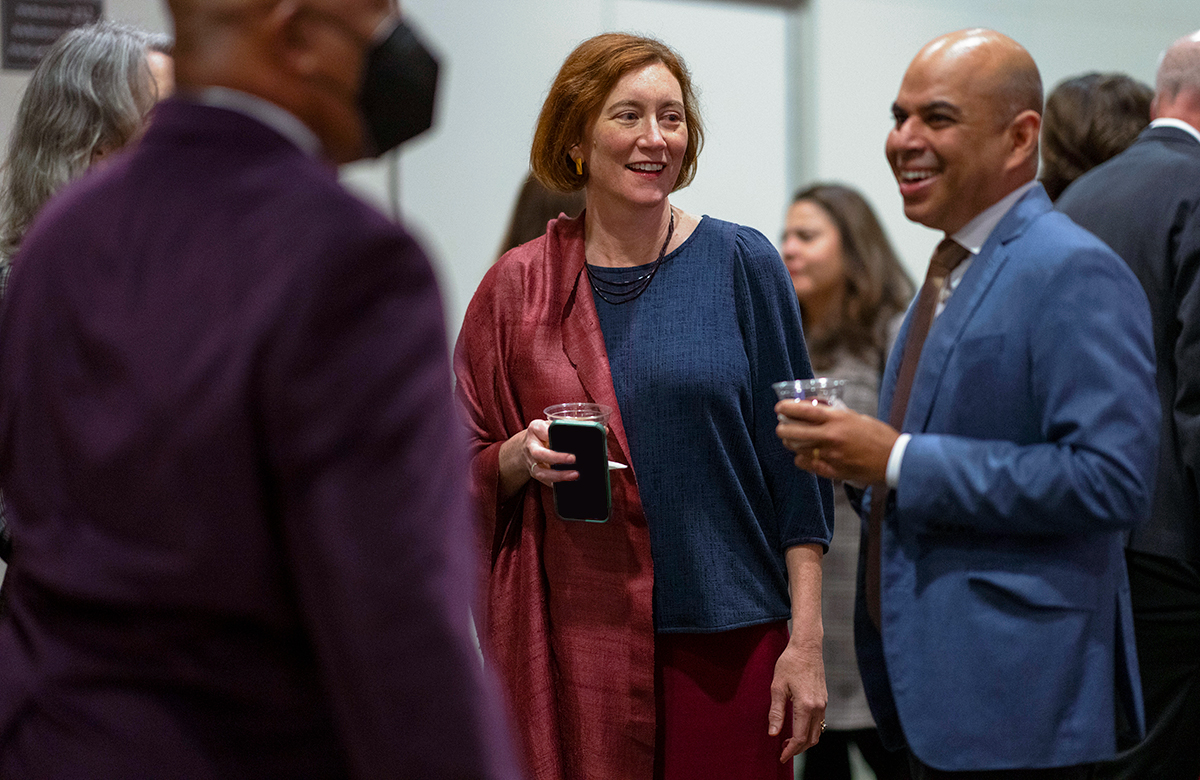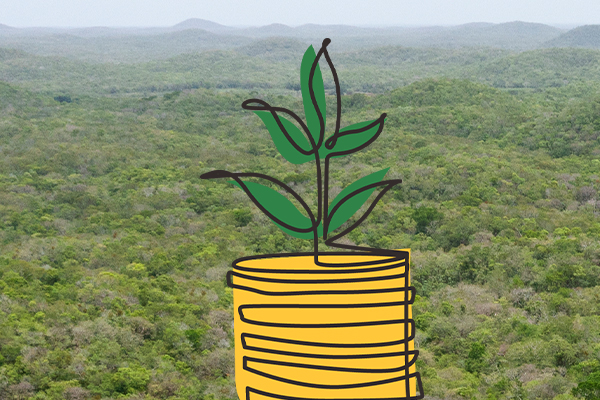You Are Always
Learning
College of Education Dean Jessica Pandya on training the next generation of educators.
Born and raised in Columbus, Ohio, Jessica Pandya moved to California soon after graduating from the University of Chicago. She earned her multiple-subject teaching credential from the New College of California and started teaching kindergarten in the San Francisco Unified School District.
Wanting to learn more about how kids learn, she went on to attain a master’s degree and a Ph.D. in Education in Language, Literacy & Culture from UC Berkeley. Pandya decided to use her knowledge to become a teacher educator, passing on what she learned from her studies and years of classroom experience.
She moved to Southern California and spent 16 years as a professor, including six years as the Liberal Studies Department chair at Cal State Long Beach. Eventually, she says, “I wanted to become one of the people who was making decisions. When the dean position opened up at CSUDH, the vision and mission of the College of Education spoke to me. This is the place I really wanted to work.” Pandya began her role as Dean of the College of Education in 2021.
The College of Education’s mission is centered on equity and social justice. How does the college prepare its students to be advocates for social change?
Primarily, that work is accomplished by our great faculty in the content of their courses. If you look at the curriculum from Liberal Studies all the way through to our brand new doctorate, you can see it in what things are called, the framing of assignments, and the way syllabi look. We have a diverse faculty who’s really interested in these issues. That’s why they’re here.
The social justice pieces are there in the kinds of programs we offer. We know that people in our community want these things. We’re at the forefront of issues like inclusion—we have a dual language certificate and a bilingual authorization program in Spanish, with those classes taught in Spanish. We’re building a Korean bilingual authorization, too. In the COE, there’s a huge focus on inclusion, disability justice, and disability rights, as well.
A lot of people don’t know what else the College of Education does besides teacher training. What are some other areas that the COE is responsible for?
Half our students are Liberal Studies majors and most of them will enter into one of our credential programs to become teachers, so it’s understandable that many people don’t know what else we do. But many of those students will then go on to get their master’s in education in Curriculum & Instruction, Dual Language Learning, Special Education, or School & College Counseling.
Eventually, some of those alumni come back to CSUDH to get their administrative credentials—after teaching for a while, they want to become school leaders or principals. So they’ll return for their administrative services credential and an MA in School Leadership, which is one of our largest graduate programs, not only in the COE but in the university.
We’ve got a great School and College Counseling MS program, which also offers a Pupil Personnel Services credential and a child and welfare authorization, which is offered in very few universities. Those are for people who want to be high school or college counselors and advisors.
We have programs in special education, dual language learning, and curriculum instruction as well, which are pretty much for frontline teachers. Most of the students in those programs are actively teaching. And starting in May 2024, we will have our first cohort of Educational Doctorate students in our Educational Leadership for Justice Doctoral program.
We started the Academic Research and Evaluation Center last year, and several partners in the community and the wider university are already taking advantage of the Center’s program and grant assessment services. And, of course, we offer several programs through the College of Continuing and Professional Education, like the Community College Teaching Certificate and the Assistive Technology Certificate.
California and the nation are facing a severe teacher shortage. Why do you think young people should consider entering the profession?
As a classroom teacher, you get to interact with 30 different kids every day who look up to you and want to learn with you. It’s a profession in which you grow all the time, because you’re never doing the same thing twice. You might do the same lesson with your first graders one year, then the next year do it again and it goes very differently. You’re always learning, you’re always adapting. For folks who like to be active learners, going to a classroom and trying to engage a room full of learners all at once is pretty great.
There’s a lot of talk about how teachers change lives, and that is certainly true. If you ask most people, “Who was your favorite teacher?” they have very specific memories and reasons, like a teacher who believed in them. The teacher who saw that they needed this particular inspiration and gave it to them, or the teacher who inspired them to ask questions, or the teacher who inspired them to become who they are now. You actually change lives all the time as a teacher.
There are also some practical reasons people like teaching. You get your summers off, so you have time to regroup. Many teachers do professional development in the summer, while others do different things—relax, take vacations, do a variety of fun activities.
It’s a pretty great job. There are great benefits. Also, there are lots of jobs in the areas where our students come from. So if you want to teach in special education, there are jobs for you. If you want to support kids with mild or extensive support needs, you can get a job. As soon as you finish your credential, you’ll likely be hired.
If you can speak Spanish and teach in Spanish, you’re going to get hired. If you are interested in becoming a math teacher and get your credential, you’ll be hired. These are high-need areas. I think sometimes people go to college and think, “What am I going to do with this degree?” You know what you can do with your teaching credential, because you can get a job very quickly.

When I decided to pursue leadership positions, two key words attracted me to this campus and its mission. CSUDH is devoted to access and transformation through education. Those words mean a lot to me, because that’s what I went through in my own journey. Education helped me open my eyes to my potential and aspirations, and really transformed me from a little girl in a male-dominated society, helping me start to think beyond what I thought I could do and turning me into who I am.”
How does the College of Education support aspiring teachers and other students?
We support our students in lots of different ways. We support them through our faculty teaching, in what we teach, how we teach, and the availability of faculty, who are always willing to guide and support students. We support them in our Student Success Center, which advises undergraduates on their progress toward a credential. We support them in graduate programs with excellent advisors.
We also support them financially. We give out a fair number of scholarships. This coming year, we’ll have even more to give, thanks to the generous Ballmer Group gift (see next page). That will give us another $17 million in scholarships to give away over the next six years. That’s mostly going towards students entering the preschool-third grade credential that we are building to open in Spring 2025, but that means that the scholarship dollars we have for other degrees will stay and hopefully grow as donors see the impact we’re having.
We host a variety of professional development activities like speakers’ series and workshops, and this semester we started study halls in our interior courtyard. We have a team of clinical practice faculty—once students get into student teaching, the faculty consult with them, place them in schools, and help with serious problems they might encounter.
We also have several faculty members whose jobs aren’t to teach, but instead are to support our students’ clinical practice, which is a huge piece of most of our programs.
We keep our curriculum very current, and constantly assess what we’re doing by asking ourselves: Are we doing a good job? Are we meeting our standards? Are our degrees valuable? We maintain really good relationships with our local school district partners, who help us keep things aimed in the right direction.
Do you get a lot of feedback from local school districts on what they need going forward?
We invite our district partners to campus once a semester, look at data with them, then have listening sessions. We ask them what kinds of students do they want to hire, what’s going on with clinical practice, what do they need from us? What professional development can we provide? Where are your shortages? All those conversations inform the direction of our college. We had over 20 partners at our last meeting this fall.
What does the future hold for the College of Education?
We’re hiring six tenure-track faculty this year, which is a lot for us, and have recently hired six new staff positions. So we’re growing. We hope to grow all of our programs. But we need to build our college faculty and staff first, because we are at capacity in almost all of our programs.
We’ll continue to see increased grant activity, and we’re going to be working on all of our financial processes and improving them. We’re also going to be intensely involved in bilingual education—we’ve already got a lot of Spanish language courses, and we’re planning to add some Korean bilingual courses, too.
We’ll continue to work on expanding technology access from a social justice perspective and on developing truly inclusive education through work in our Snap, Inc. Institute for Technology and Education.
What would you like Toro students to know about the college that they may not know?
I’d like students to know that if you like learning, you might want to consider being a teacher.
And if you didn’t like learning, you might also want to consider becoming a teacher, because you could do a better job. I mean, you can become the teacher you wish you had! There’s a lot to do in education and we are an open place for folks to come learn.



